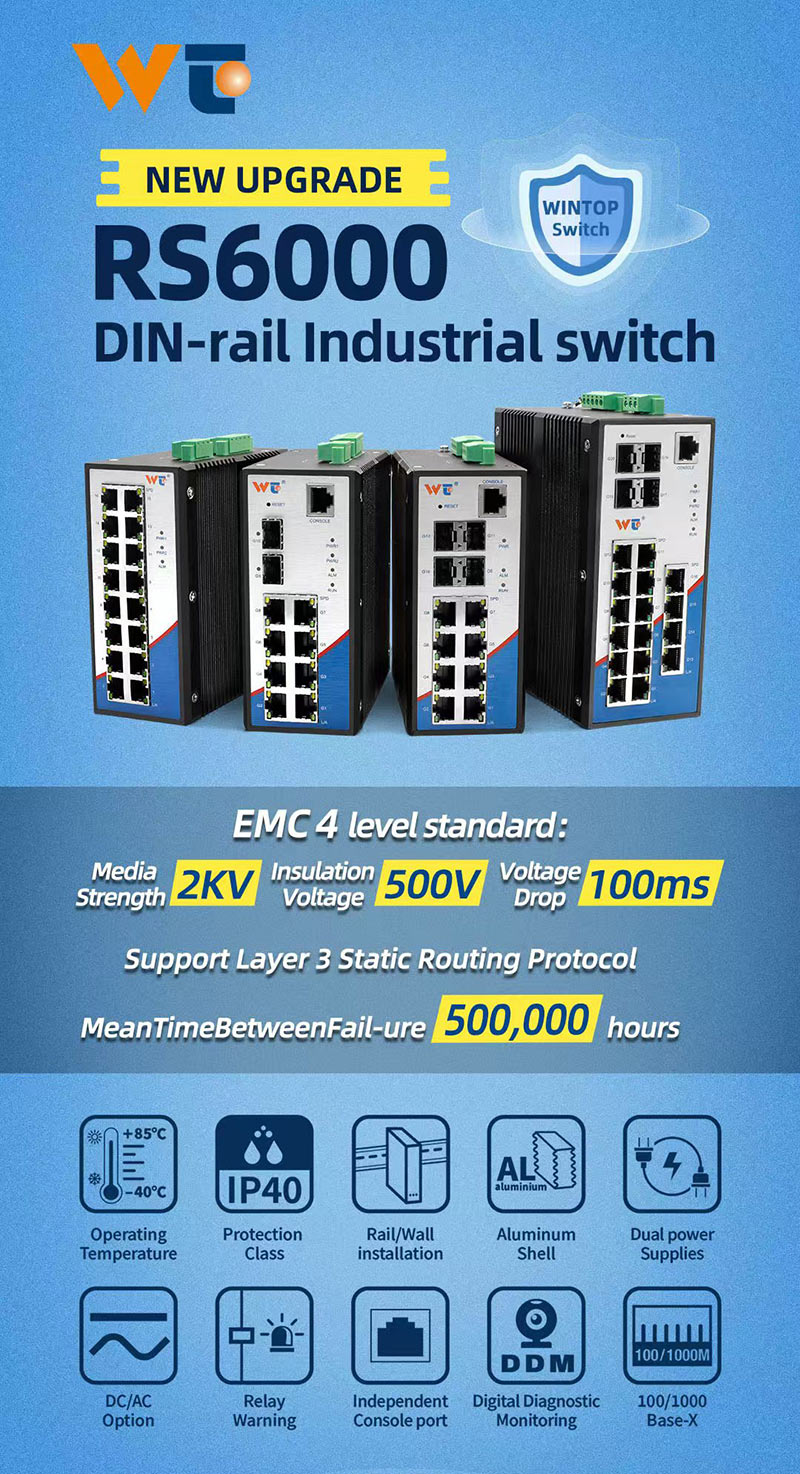Introduction
In the bustling world of modern urban transit, metro and light rail systems play an essential role in the daily commute of millions. As these networks expand and become increasingly complex, ensuring stable and efficient signal transmission for monitoring and control systems is more critical than ever. But what happens when signal transmission issues arise, potentially jeopardizing the safety and efficiency of these transit systems? The solution lies in the deployment of industrial switches, which offer robust communication and a stable connection. This article delves into the significance of addressing signal transmission issues in metro and light rail monitoring and explores how industrial switches can be the game-changer we need.
The Critical Role of Signal Transmission in Urban Transit
In metro and light rail systems, reliable signal transmission is paramount. These signals are responsible for transmitting data related to train positions, speed, braking systems, and more. A failure in signal transmission can lead to disastrous consequences, including train collisions, delays, and compromised passenger safety. Thus, ensuring uninterrupted and accurate signal transmission is of utmost importance.
The Complexity of Metro and Light Rail Networks
Urban transit systems are intricate and often span vast areas, with numerous interconnections and critical points that require constant monitoring. The complexity of these networks means that any disruption in signal transmission can have a cascading effect, impacting multiple trains and routes simultaneously. This complexity necessitates a robust communication infrastructure capable of handling high data volumes with minimal latency.
Industrial Switches: The Backbone of Efficient Communication
What Are Industrial Switches?
Industrial switches are specialized network switches designed to withstand harsh environments and provide reliable connectivity in industrial settings. Unlike conventional switches, industrial switches are built to operate in extreme temperatures, resist electromagnetic interference, and endure physical shocks and vibrations. These characteristics make them ideal for use in metro and light rail systems.
Enhancing Signal Transmission Stability
Industrial switches are engineered to ensure stable signal transmission, even in the most challenging conditions. They feature advanced redundancy protocols, such as Rapid Spanning Tree Protocol (RSTP) and Ethernet Ring Protection Switching (ERPS), which provide alternative communication paths in case of a failure. This redundancy ensures that signal transmission remains uninterrupted, thereby enhancing the overall reliability of the transit system.
Real-World Applications and Case Studies
Case Study: Tokyo Metro
Tokyo Metro, one of the busiest metro systems in the world, faced significant challenges with signal transmission due to its extensive network and high passenger volume. By implementing industrial switches, Tokyo Metro was able to achieve a stable and efficient communication infrastructure. The switches' ability to withstand high temperatures and vibrations ensured uninterrupted signal transmission, even during peak hours. This improvement not only enhanced operational efficiency but also significantly boosted passenger safety.
Scenario: Emergency Situations
Consider a scenario where a metro system experiences a sudden power outage. In such an event, maintaining communication between trains and control centers is crucial for managing the situation effectively. Industrial switches, with their robust design and redundancy features, ensure that signal transmission remains stable, allowing for real-time coordination and swift resolution of the issue. This capability is vital in preventing accidents and ensuring passenger safety during emergencies.
The Importance of Redundancy and Reliability
Redundancy: A Safety Net for Signal Transmission
Redundancy in communication networks is akin to having multiple backup plans. Industrial switches offer several redundancy mechanisms, ensuring that if one communication path fails, another is immediately available. This feature is crucial in metro and light rail systems, where even a momentary loss of communication can have severe consequences. By providing redundant paths, industrial switches enhance the network's resilience and reliability.
Reliability: Ensuring Continuous Operation
Reliability is a core attribute of industrial switches. Their ability to operate continuously under harsh conditions makes them indispensable in metro and light rail monitoring. These switches undergo rigorous testing to ensure they can perform reliably in environments with high electromagnetic interference, extreme temperatures, and constant vibrations. This reliability translates to fewer signal transmission issues, reduced maintenance costs, and enhanced operational efficiency.
Future Trends and Technological Advancements
Advancements in Industrial Switch Technology
The field of industrial switch technology is continually evolving, with new advancements aimed at further enhancing reliability and efficiency. Innovations such as Time-Sensitive Networking (TSN) are being integrated into industrial switches, offering precise control over data transmission and minimizing latency. These advancements are set to revolutionize signal transmission in metro and light rail systems, making them more efficient and reliable than ever before.
The Role of IoT and Smart Cities
The Internet of Things (IoT) and the concept of smart cities are driving significant changes in urban transit systems. Industrial switches play a pivotal role in this transformation by providing the necessary infrastructure for real-time data communication and analysis. As metro and light rail systems become more interconnected and data-driven, the demand for reliable and efficient signal transmission solutions, such as industrial switches, will continue to grow.
Conclusion
In conclusion, solving signal transmission issues in metro and light rail monitoring is crucial for ensuring the safety, efficiency, and reliability of urban transit systems. Industrial switches offer a robust and effective solution, providing stable communication and enhancing the overall resilience of these networks. As technology advances and urban transit systems evolve, the role of industrial switches will become increasingly significant, paving the way for safer and more efficient public transportation. By embracing these technologies, we can ensure that our metro and light rail systems are well-equipped to meet the challenges of the future.
Final Thoughts
The importance of reliable signal transmission in metro and light rail systems cannot be overstated. With industrial switches at the helm, we can create a communication infrastructure that not only meets today's demands but also anticipates the needs of tomorrow. As cities grow and transit systems expand, investing in advanced industrial switches will be key to maintaining the safety and efficiency of our urban transportation networks.
